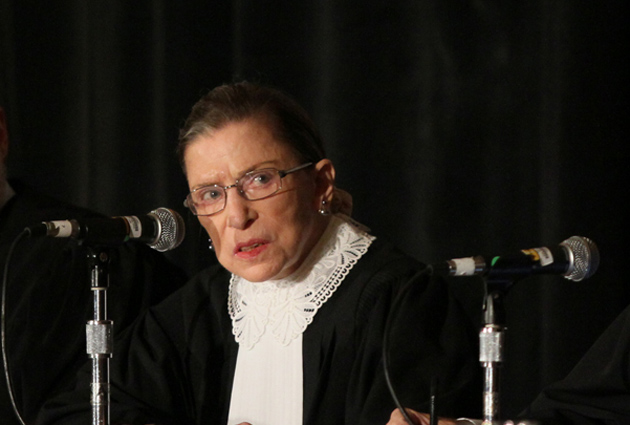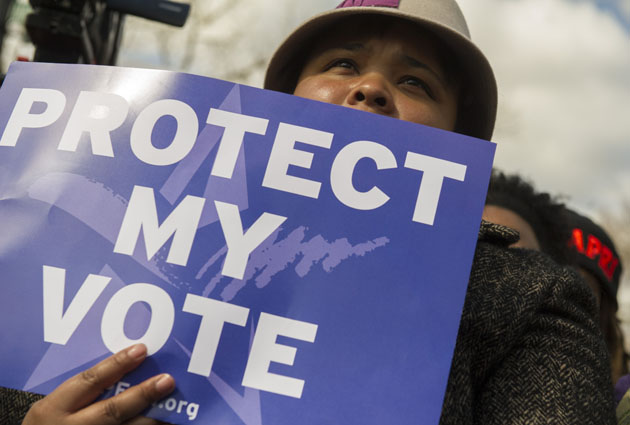
<a href="http://zumapress.com/zpdtl.html?IMG=20110818_zaf_s44_010.jpg&CNT=34">Charlie Neuman</a>/ZumaPress
Justice Ruth Bader Ginsburg wrote a fiery dissent to the Supreme Court’s 5-4 decision Tuesday striking down the part of the 1965 Voting Rights Act that determines which cities, counties, and states need to seek approval from the Department of Justice before changing their voting laws. The provision was designed to focus attention on areas with a history of discrimination. “Hubris is a fit word for today’s demolition of the VRA,” Ginsburg wrote.
Here are five key excerpts from her dissent:
- “When confronting the most constitutionally invidious form of discrimination, and the most fundamental right in our democratic system, Congress’ power to act is at its height.”
- “Demand for a record of violations equivalent to the one earlier made would expose Congress to a catch-22. If the statute was working, there would be less evidence of discrimination, so opponents might argue that Congress should not be allowed to renew the statute. In contrast, if the statute was not working, there would be plenty of evidence of discrimination, but scant reason to renew a failed regulatory regime.”
- “Just as buildings in California have a greater need to be earthquake proofed, places where there is greater racial polarization in voting have a greater need for prophylactic measures to prevent purposeful race discrimination.”
- “Congress approached the 2006 reauthorization of the VRA with great care and seriousness. The same cannot be said of the Court’s opinion today. The Court makes no genuine attempt to engage with the massive legislative record that Congress assembled. Instead, it relies on increases in voter registration and turnout as if that were the whole story. See supra, at 18–19. Without even identifying a standard of review, the Court dismissively brushes off arguments based on “data from the record,” and declines to enter the “debat[e about] what [the] record shows”…One would expect more from an opinion striking at the heart of the Nation’s signal piece of civil-rights legislation.”
- “Given a record replete with examples of denial or abridgment of a paramount federal right, the Court should have left the matter where it belongs: in Congress’ bailiwick.”
Ginsburg’s dissent also rattled off these eight examples of race-based voter discrimination in recent history:
- “In 1995, Mississippi sought to reenact a dual voter registration system, ‘which was initially enacted in 1892 to disenfranchise Black voters,’ and for that reason was struck down by a federal court in 1987.”
- “Following the 2000 Census, the City of Albany, Georgia, proposed a redistricting plan that DOJ found to be ‘designed with the purpose to limit and retrogress the increased black voting strength…in the city as a whole.'”
- “In 2001, the mayor and all-white five-member Board of Aldermen of Kilmichael, Mississippi, abruptly canceled the town’s election after ‘an unprecedented number’ of AfricanAmerican candidates announced they were running for office. DOJ required an election, and the town elected its first black mayor and three black aldermen.”
- “In 2006, the court found that Texas’ attempt to redraw a congressional district to reduce the strength of Latino voters bore ‘the mark of intentional discrimination that could give rise to an equal protection violation,’ and ordered the district redrawn in compliance with the VRA…In response, Texas sought to undermine this Court’s order by curtailing early voting in the district, but was blocked by an action to enforce the §5 pre-clearance requirement.”
- “In 2003, after African-Americans won a majority of the seats on the school board for the first time in history, Charleston County, South Carolina, proposed an at-large voting mechanism for the board. The proposal, made without consulting any of the African-American members of the school board, was found to be an ‘exact replica’ of an earlier voting scheme that, a federal court had determined, violated the VRA…DOJ invoked §5 to block the proposal.”
- “In 1993, the City of Millen, Georgia, proposed to delay the election in a majority-black district by two years, leaving that district without representation on the city council while the neighboring majority white district would have three representatives…DOJ blocked the proposal. The county then sought to move a polling place from a predominantly black neighborhood in the city to an inaccessible location in a predominantly white neighborhood outside city limits.”
- “In 2004, Waller County, Texas, threatened to prosecute two black students after they announced their intention to run for office. The county then attempted to reduce the avail ability of early voting in that election at polling places near a historically black university.”
- “In 1990, Dallas County, Alabama, whose county seat is the City of Selma, sought to purge its voter rolls of many black voters. DOJ rejected the purge as discriminatory, noting that it would have disqualified many citizens from voting ‘simply because they failed to pick up or return a voter update form, when there was no valid requirement that they do so.'”
This article has been revised.











